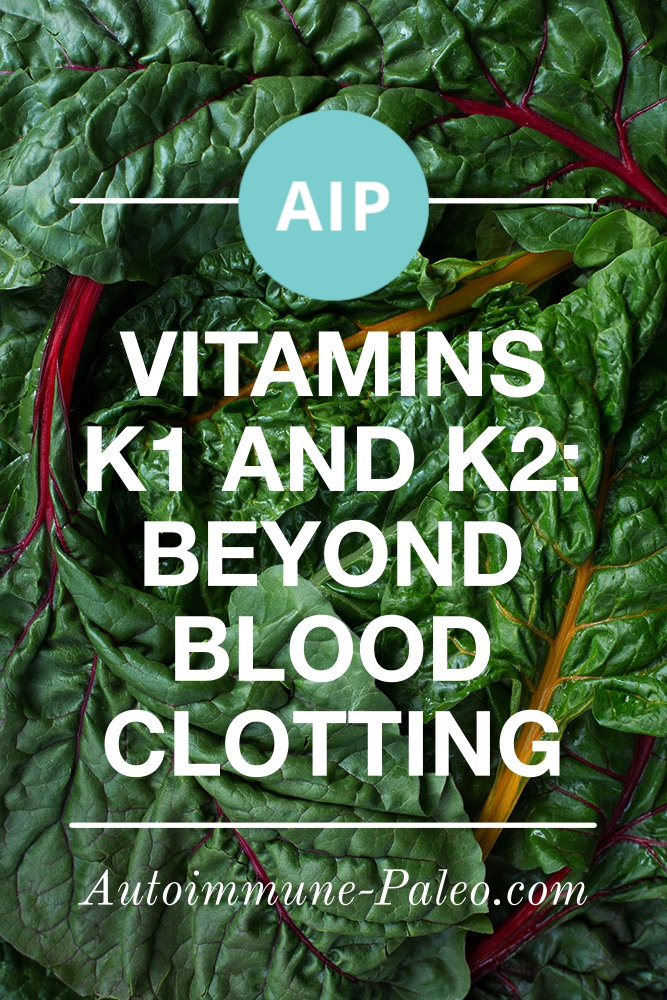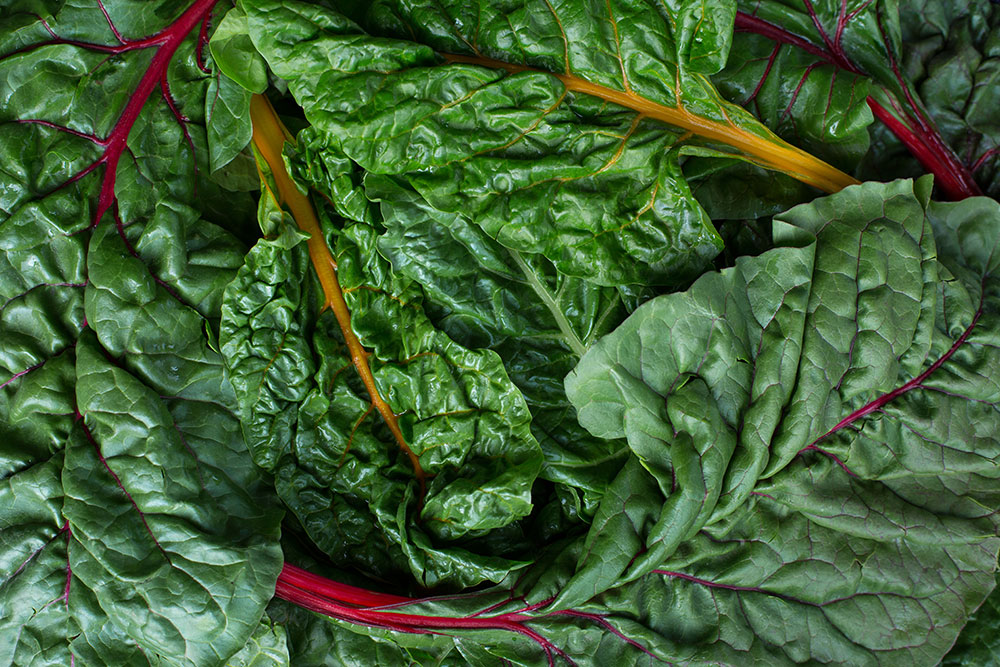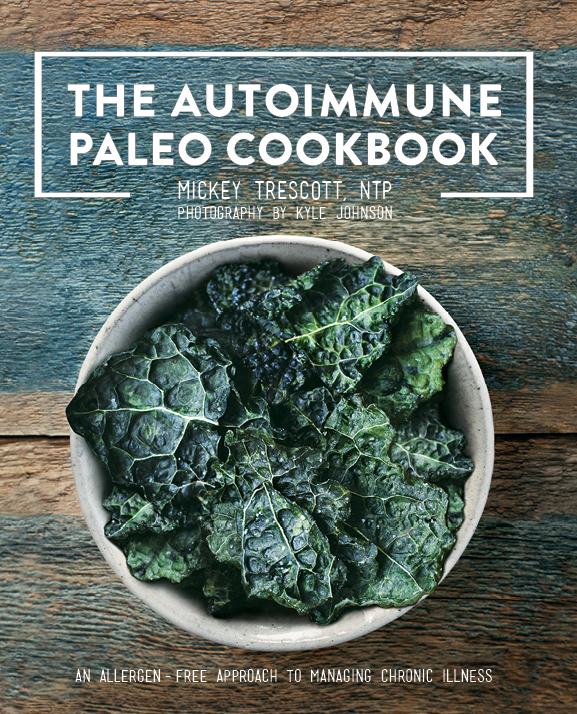This post contains affiliate links. Click here to see what that means!
That being said, we only promote authors, products, and services that we wholeheartedly stand by!
This article is the second of an ongoing series on fat-soluble vitamins, covering those that are integral to health and healing from chronic illness but often lacking in the modern diet. Check out my article on the importance of vitamin D, and Angie’s articles on vitamin A and vitamin E.
You have most likely heard more about the other fat-soluble vitamins, D, A, and E, but what about the lesser-known vitamin K? This nutrient flew onto my radar a few years ago when I started getting serious about healing my tooth decay that resulted from a decade of Veganism (more on that topic in another blog post!). I faced some early misconceptions about the K vitamins since I have a genetic blood clotting disorder that runs in my family — my grandmother can’t have any greens since she is on blood thinners, and would always lecture me about the clotting effects of Vitamin K. it wasn’t until I started looking into the specifics that I learned that there were two forms of vitamin K, each with different effects on coagulation, and K2 having many additional functions that I was unaware of. If you find yourself in the same boat, read on to find out more!
What is Vitamin K?
Vitamin K actually refers to a group fat-soluble vitamins, K1 and K2, found in leafy greens as well as animal products that are best known for their role in blood clotting. vitamin K1 is found in abundance in the diet in green leafy vegetables. Vitamin K2 is produced by bacteria as a byproduct of fermentation. Although K1 is easy to obtain in the diet, its absorption is low, around 10%, while K2 is much more difficult to obtain, but readily absorbed. It was only recently that the differences and functions of these two types of vitamin K became more understood.
What do vitamins K1 and K2 do in the body?
While most people are familiar with the role both vitamins K1 and K2 share in blood clotting (through the activation of coagulation factors in blood), not as many are aware that the important role K2 plays in cardiovascular health. Vitamin K2 also plays a role in depositing calcium in the correct locations throughout the body, like the bones, teeth, instead of the soft tissues. This article suggests that vitamin K2 has a role in cancer prevention (prostate) as well as skin and brain health, as well as suggests that the functions of K1 and K2 are so different that they be considered two separate vitamins entirely.
How does K2 promote cardiovascular, bone, and dental health? Its job is to make sure calcium gets to where it needs to go, and keep it out of the soft tissues like the kidneys and joints. An adequate source of K2 encourages the body to build strong bones and teeth.
What does deficiency look like?
Vitamin K1 deficiency causes symptoms associated with lack of blood clotting, like easy bruising, bloody nose, excessive bleeding, and heavy periods. Since vitamin K1 is so abundant in leafy green vegetables, most people don’t need to worry about becoming deficient or taking a supplement. Just eat your veggies!
Vitamin K2 deficiency causes the opposite of what we talked about in the previous section — weak bones, teeth, and calcification of the arteries, as well as other soft tissues. Not good, and unfortunately this type of deficiency is more common!
Just like vitamin D, vitamins K1 and K2 levels can be measured, although it is difficult to obtain an accurate result due to diet’s quick-acting effect on your levels. Results change rapidly one day to the next, making the results unreliable.
If you suffer from cardiovascular disease, osteoporosis, tooth decay, or calcification of soft tissues, it is safe to assume you should be better prioritizing your K2 intake, and talking to your doctor about supplementation.
How do you get vitamin K1 and K2?
Vitamin K1 is quite easy to obtain in the diet, especially for someone on the Autoimmune Protocol — it is found with abundance in leafy green vegetables like kale, chard, spinach, collard greens, parsley, broccoli, and brussels sprouts. You can pretty much bet that if it is a vibrant green color, there is going to be plenty of vitamin K1 contained within!
Vitamin K2, on the other hand, is a little more difficult to come by, especially on the elimination diet. Organ meats (especially liver) as well as fermented foods (meats as well as vegetables) are a good source of K2 while on the Autoimmune Protocol. It is found in lesser quantities in grass-fed or pastured meats. For those who have successfully reintroduced foods, both hard and soft cheeses, butter, and egg yolks can be good sources of K2.
While it was once thought that vitamin K2 was produced by our gut flora, recent research has shown that any K2 produced is not available to be absorbed by our bodies, making it necessary to obtain in the diet.
If I need to take a K2 supplement, which kind should I choose?
Since vitamin K2 is less abundant on the Autoimmune Protocol due to the exclusion of eggs and dairy in the diet, it might be wise to talk to your doctor about a K2 supplement if you are going to be on the elimination diet long-term, or if you suffer from related conditions (cardiovascular disease, osteoporosis, or tooth decay). While the Autoimmune Protocol is an incredibly nutrient-dense way of eating, I believe that those who do not tolerate reintroductions or have poor gut health should consider a high-quality supplement. I take this one because I do not tolerate dairy of any kind, and I do not eat eggs often. Look for a product that is carried in fat (as K2 is fat soluble) and free from additives or other ingredients.
It is important to note that anyone on blood thinning medication should speak to their doctor before changing their intake of vitamin K, either through diet or supplementation, as this can quickly change the effects of medication.
Read the rest of our Fat Soluble Vitamins Series here.
Resources:
https://chriskresser.com/vitamin-k2-the-missing-nutrient/
https://articles.mercola.com/sites/articles/archive/2015/01/11/vitamin-k1-k2.aspx 


















34 comments
[…] Vitamins K1 and K2: Beyond Blood Clotting! – Autoimmune Paleo says 04/01/16 […]
Love how we’re on the same wave length so often! I already take the Thorne research vitamin k2 drops…was wondering how many drops do you take a day, and where do you place it, in your mouth or on your skin? Thank you!
Hey Ana! I take 3-5 drops a day on my tongue. Thats a dosage that my doctor has recommended since I have a genetic clotting condition and need to be careful with K vitamins. The dosage on the bottle is much higher, 15 drops.
Vitamin K has mutple functions. The recent rage is K2 w/ integrative physicians, but I just want to know about blood clotting K. I’m older so elasticity of blood vessels is an issue and degration of vascular system is certainly a byproduct of massive stress over several years, due to family issues. etc. I know collagen formation and elastin are diminished, but need nuts and bolts of basic K integration with these other destructive issues.
k1-k2 good wored abount blood cloting
Hi Ana
is your genetic clotting disorder called APS? Just curious because i have that and must take warfarin so im nervous about the k2 drops!
Thank you
Holly
Thanks for this helpful summary. But I am still left wondering about this subject.
Where can we look up the vitamin K2 amounts in the foods you mention?
How much do we need: — for basic health and prevention? to reverse vascular calcification?to restore bone or joint health?
As far as I can tell K2 is not amount the micronutrients reported in most food databases.
And I have not yet found listed as an essential nutrient in secondary scientific sources.
How can we plan to feed our families the optimum amount for health and prevention?
How can we find out how much is in beef liver, or poultry liver, egg yolks, . . . .?
How can we be persuasive about it to our friends and family without good scientific sources to cite?
Hi Jane! There isn’t a good resource for the amount of K2 in foods, as you’ve found. K2 is such a newly researched vitamin that I don’t think we have the level of information that we do on other vitamins.
My recommendation is to make sure there is a K2 source in the diet. As there are very few foods with K2 content, if you are not eating them, I think it is reasonable to suspect a supplement may be helpful. Are you or your family eating hard cheeses or dairy from pastured cows, egg yolks from pastured chickens, and organ meats? Do they suffer from any conditions linked to low K2–dental decay, osteoporosis, heart disease?
Answering these questions does not help us come up with a specific value per day, but instead we may need to be guided by our intuition. How this is handled in my family–I do not tolerate dairy and eat pastured eggs occasionally, organ meats all the time. I also have issues with my teeth which have improved with K2 supplementation. Because I likely don’t get enough in my diet since I don’t eat dairy, I supplement. My husband, on the other hand, eats pastured dairy, as well as more eggs than I do as well as organ meats. He doesn’t supplement.
About the scientific studies–I would stay tuned to Chris Kresser’s writing and research on the topic. K2 is on his radar and his articles have been the most informative and well researched I’ve found.
Hope it helps!
What if i only have one copy of Factor V lieden , can I take K2 to help my osteo
Weston Price wrote about “factor X” which is found in “butter oil” and was the reason butter oil so critical in restoring health to malnourished people. Turns out the mysterious factor X is actually K2. Butter oil is another name for ghee.
Yep! That butter oil needs to come from pastured cows, eating the first green grass of spring… kind of hard to come by!
I have been taking life extensions super K with advanced K2 complex. I has the correct ratio MK 2–4 and MK 2–7. What do you think of this product been doing Paleo three years and AIP on and off for a few months. Have recovered from SBIO – leaky gut. Had osteopenia, and my bone scan shows some improvement in the last five years.
Hey Victoria, happy to hear of your success supplementing with K2 and eating Paleo!
I used to take that same supplement for D/K2 and recently found out from the company that is has soy in it. So it’s still not a good option for those of us that can’t or don’t want to eat soy, especially since the company doesn’t certify their ingredients as being non-GMO. I have been looking for a K2 that is elimination diet compliant and would love to know if you’ve found any.
Hi Dawn, this is hard to find because most K2 supplements are made by fermenting soy (it is one of the highest natural concentrations of K2 in the diet). Seeking health has a soy-free K2 supplement, but I haven’t tried it since the Thorne works so well for me. Hope it helps!
I am interested in this supplement (worried since I have Factor V Leiden, heterozygous). Do you have any thoughts on this? https://ritual.com/pages/ingredients
Hey Karen! I can’t make supplement recommendations without taking a history, and honestly with something as complex as Factor V you should consider talking to a doctor. Anything that affects blood thinning/clotting can be tricky to dial in. I wish I could be more helpful!
I had the same question on if I could take it. I too have factor five Leiden and I do eat greens but keep at a distance to supplements that could give me a clue as I’ve never had a problem with my factor 5 and not interested in getting one .
Brandie,
This is advice you should be getting from a healthcare provider.
Hi Mickey! I’m wondering what the name of your blood condition is? I was diagnosed with one called Anti-phospholipid syndrome about a year ago and trying to find the right diet plan for healing. I’m on blood thinners but not Coumadin, so I do not believe vitamin K is an issue. However, would you recommend it as a healing supplement anyway?
Hi Sara,
I have Factor V Leiden mutation, which causes blood clots. It is very important to work with your doctor on this one, as vitamin K from both diet and supplements can change your ability to clot quite dramatically. Wishing you luck!
I also have Factor V (heterozygous) I’m trying to learn if K2 is okay (it seems like K1 would be problematic). I also love green leafy vegetable…..sigh.
[…] illness, but often lacking in the modern diet. You can read Mickey’s previous posts here and here. Stay tuned for a further article on vitamin […]
[…] often lacking in the modern diet. Check out Mickey’s previous articles on the importance of vitamin K and vitamin D, and my article on vitamin […]
Hello does vitamin k2 help with heavy menstrual periods? It will reduce the bleeding?
Hi Judy, I am not sure! I have been taking K2 for a few years now and have not noticed a difference in my flow.
Hi Mickey, you told one enquirer
you don’t discuss your supplement routine, while you told another enquirer you’ve been taking Vit K2 for awhile and it hasn’t affected your flow. So you do have factor Five Leiden and do take K2. So are we to assume it’s safe to take a Vit D 3 supplement that has K2 in it?
Hi Carol! I don’t share the actual doses of anything I take. And no, it is not safe to assume that because I take something it is right for you, especially if you have a genetic condition that may come with a contraindication, like Factor V Leiden. This is something that needs to be discussed with your doctor.
Does vitamin k2 promote blood clotting similar to k1?
Yes I would like to know this also. I cant seem to find the answer anywhere 🙂
I am a factor V Leiden carrier (heterozygous ) which puts me at a slightly higher risk for a blood clot. I have osteoporosis in my spine -2.9. I have been told my number is not that bad but of course the suggest medication. My doctors are not familiar with K-2. I would like to take a plant based calcium with k-2 but I am confused about blood clotting. If you have any information I would appreciate it.
Thank You
Hi Cheryl, I also carry factor V leiden but I can’t advise on if K2 is OK for you to take – that would be a good question for your doctor. Sorry I can’t be more helpful!
Mickey, do you take K2 since you have Factor V Leiden?
Hi Pam, I don’t share my supplement routine, it is something you should run by your doctor. K vitamins and clotting can interact and you really need a medical professional to take a look at the whole health picture.